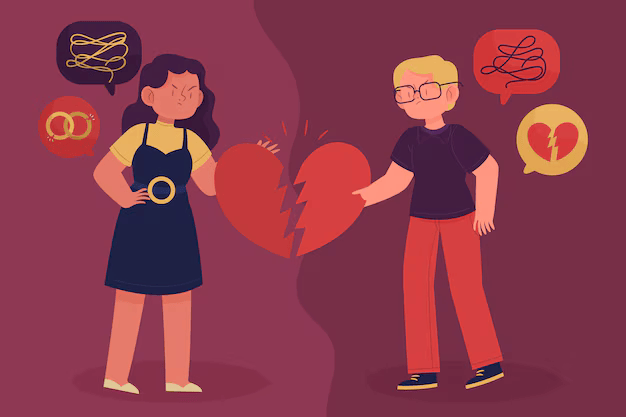A vital but frequently disregarded component of general wellbeing is men's mental health. Social expectations and stigma can make it challenging for men to express emotions or seek help when struggling with issues like stress, anxiety, depression, or relationship challenges. This silence often leads to feelings of isolation and untreated mental health concerns. Encouraging open conversations and seeking professional support, such as therapy or counseling, can help men build resilience, enhance emotional intelligence, and develop healthier coping mechanisms.
Do men suffer after a breakup?
Yes, men often suffer after a breakup, though they may not always show it outwardly. Breakups can lead to feelings of loneliness, sadness, and low self-esteem. Men might experience emotional stress, anxiety, and even depression as they navigate the loss. Seeking support through relationship counseling or talking to trusted friends can help them process their emotions and heal effectively.
Recognizing the Signs of Relationship Breakdown Affecting Men's Health
A relationship breakdown can significantly impact men’s emotional and physical well-being. Recognizing these signs early and addressing them with “Relationship counsellors” or couple counselling can prevent long-term damage.
-
Emotional Withdrawal: Men may become distant and avoid meaningful conversations or emotional engagement.
-
Increased Irritability: A noticeable rise in anger or frustration over minor issues can indicate underlying stress.
-
Loss of Interest: Hobbies, work, or social activities that once brought joy might no longer appeal to them.
-
Sleep Disturbances: Difficulty falling or staying asleep, or excessive sleeping, can result from emotional distress.
-
Appetite Changes: Anxiety or sadness are frequently associated with overeating or a decrease in appetite.
-
Social Isolation: They may withdraw from friends and family, feeling embarrassed or unable to share their struggles.
-
Decline in Physical Health: Unexplained fatigue, headaches, or other physical ailments may arise due to prolonged stress.
-
Low Self-Esteem: Feelings of inadequacy or blaming themselves for the breakup can impact self-worth.
-
Risky Behaviors: Turning to alcohol, drugs, or other harmful behaviors to cope with emotional pain is a warning sign.
-
Difficulty Concentrating: Poor focus at work or in daily tasks can signal mental health struggles.
-
Persistent Sadness or Anxiety: A sense of hopelessness or constant worry about the future often accompanies relationship breakdowns.
-
Avoidance of Conflict Resolution: Refusing to address issues or participate in couple counselling sessions can worsen the situation.
Identifying these symptoms is the first step to recovery. Seeking relationship counselling or “Couple counsellor” can provide men with the tools and support needed to navigate their emotions, rebuild confidence, and foster healthier future relationships. Professional help ensures they don’t face these challenges alone.
How to Support Men During Relationship Breakdowns
-
Open Communication: Encourage men to talk about their feelings without judgment. This helps them process emotions and identify the root of their distress. Seeking relationship counselling can guide open and effective communication.
-
Validate Their Emotions: Let them know their feelings are valid and normal. This helps them feel understood and reduces isolation.
-
Encourage Professional Help: Suggest seeking couple counselling to work through relationship issues together, fostering mutual understanding and resolution.
-
Build a Support Network: Encourage connection with friends or family for emotional support, which can help combat loneliness and isolation.
-
Promote Self-Care: Advise them to engage in physical activities, proper sleep, and healthy eating to improve mental and emotional resilience.
-
Focus on Goals: Help them redirect their energy toward personal or professional goals to rebuild self-esteem and reduce anxiety.
-
Seek Therapy for Grief: Breakups can feel like a loss. Professional therapy, such as relationship counselling, can help manage grief effectively.
-
Identify Unhealthy Patterns: Assist in recognizing toxic behaviors or recurring conflicts that might have contributed to the breakup.
-
Support Positive Coping Mechanisms: Discourage unhealthy coping strategies like substance abuse and promote healthy alternatives like meditation or hobbies.
-
Encourage Personal Growth: Focus on self-improvement and personal growth, helping them see the breakup as an opportunity for transformation.
-
Discuss Future Relationships: Help them build a healthier perspective on future relationships by working through unresolved emotions with couple counselling experts.
-
Monitor Mental Health: Keep an eye on signs of depression or anxiety and encourage them to consult a professional if these persist. Relationship counselling can be instrumental in healing and moving forward.
In conclusion, men do suffer after a breakup, even if societal norms sometimes discourage them from expressing their emotions. Acknowledging their feelings and seeking support, such as relationship counseling, can significantly aid in their emotional recovery.



